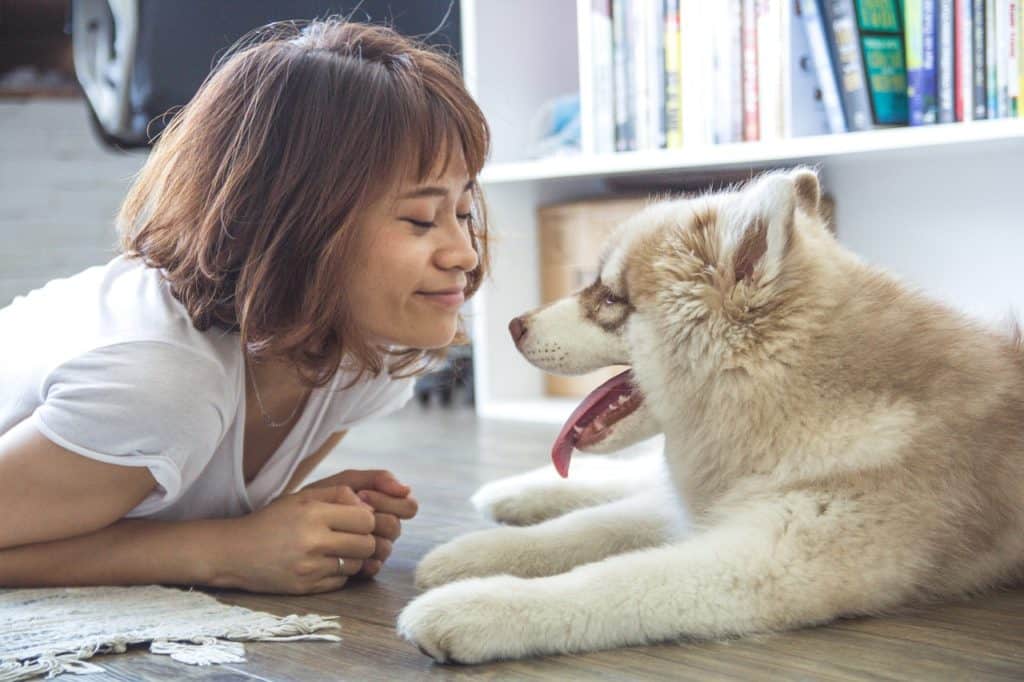Does My Dog Actually Love Me?
Posted by Lora Shaw on December 8, 2016

Ask almost any pet lover whether or not their dog loves them, and you’ll get the same answer – of course they do! To many of us, the love we feel for our dog is obviously mutual.
But do dogs feel “love” in the way that we understand it? Animals perceive the world and interact with others differently than humans, especially given our tendency to anthropomorphize them. What we perceive as “love” very well could be something else. Though that is the case, the more we learn about them, the more it seems the answer to the question is a resounding “yes!”
Key Takeaways from Our Findings
- Based on an Emory University study, dogs tend to view their caregivers in the same way babies view their parents, and these results are apparent in how different scents can trigger the reward center in a dog’s brain
- Things like eye contact, physical touch, following, and gifting can be telltale signs that your dog loves you
- Petting, kissing, and hugging your furry friend can provide them with emotional comfort and reinforcement, though, in some cases, some dogs don’t like the interaction
Science Reveals if Dogs Do Feel Love
For any dog lovers, we don’t have to convince you that your dog’s love and affection are real. But for the skeptics out there, science seems to agree with us. Dogs can’t say it out loud, but we’ve developed other methods of determining their feelings. Specifically, studying their brains.
Some years ago, Emory University scientists investigated the emotional state of dogs using magnetic resonance imaging. They exposed dogs to certain odors and then scanned their brains, studying the emotional state through the change in brain function.
While humans see the world with their eyes, dogs navigate the world with their noses. The way that dogs respond to smells reflects their feelings, which is why scientists exposed them to both familiar and unfamiliar humans and dogs for the experiment.
During this time, they found that when a dog smelled the aroma of their owner, the “reward center” of the brain was triggered. This part of the brain contains dopamine receptors that light up when exposed to enjoyable experiences, both in humans and dogs. In the experiment, the dogs responded more favorably to human odor than other odors, and their reward center was activated most significantly when the dog smelled someone they knew. A similar response is shown by humans when they are shown photos of someone they love.
Along with neuroscience, behavioral studies show strong indications that our dogs do actually love us. According to neuroscientist Attila Andics (the lead author of the study mentioned above), dogs view their caregivers much the same way that human babies view their parents, going to the caregiver when afraid or distressed, rather than running away like other animals.
How Your Dog Expresses Their Love
Obviously, your dog can’t come out and tell you they love you. But most pet lovers are able to pick up on the subtle signs of his or her affection, and dogs have a few unique ways of doing this. When you’re left wondering “Does my dog love me?” look at this list and you’ll be reminded of all of the ways that they do!
Eye Contact
For one, dogs are the only non-primate animal that seeks to make eye contact with humans. When they do, their brains release oxytocin, a pleasure-inducing hormone, and so do ours.
Dogs that have an emotional attachment to their humans will likely maintain eye contact using soft and relaxed eyes. If they don’t like eye contact but you catch them looking at you, this could be another sign of their affection.
“Our data suggests that owner-dog bonding is comparable to human parent-infant bonding, that is, oxytocin-mediated eye-gaze bonding,” reports Takefumi Kikusui, an animal behaviorist who has studied the phenomenon.
Physical Touch
Other behaviors indicating our dogs love us include their desire to have physical contact with us, particularly as a way of showing gratitude after we give them food. Another telling act is that our dogs actually want to sleep in our beds with us.
Additionally, dogs who lean are showing affection. When your dog leans their body weight against you, it signifies their trust, comfort, and security.
“Dogs are highly social, but they are also very flexible. They will prefer to be with the members of their social group, whether it is other dogs, cats, children, or adults. Where they prefer to sleep indicates who they consider their BFFs,” Berns writes in The Wall Street Journal.
Reactions
The way your dog reacts to you leaving or arriving home is also a strong indicator of their fondness for you, according to Berns. If you’re skeptical, he suggests watching how your dog reacts to other humans coming and going who they haven’t formed a bond with.
When you get home, you probably notice physical signs of excitement. These signs may include jumping, tail wagging, barking, or other talking noises. The enthusiasm and full-body excitement you notice are some of the most obvious and endearing signs of attachment, and should leave you with a confident “yes” when wondering “Do dogs feel love?”
Other Small Signals
- Following – A dog that is emotionally attached will follow their person around. If you’ve ever seen your dog sitting nearby as you go to make your coffee, do the dishes, or throw in a load of laundry, it’s clear that they want to be involved in your life.
- Gifting – Other dogs will show their attachment by bringing their human toys and other gifts throughout the day. So when your pup runs up to you with their favorite toy, they might want to play or show their appreciation for you.
FAQs About the Love Dogs Feel for Their Owners
Do dogs feel love differently than humans?
The love dogs feel for their owners is unmatched. Dogs experience emotions differently than humans, but the basic feelings of attachment, affection, and bonding are very similar. Typically, humans will verbalize their feelings of love, whereas dogs show their love through actions and behaviors.
Do dogs form bonds with multiple people?
Absolutely! Dogs grow fond of individuals who consistently care for or spend time with them. Dogs may also form bonds with other furry friends, so it is possible that they show fondness for other dogs, cats, and any other pets as well.
When will my puppy start feeling love for me?
Dogs cycle through emotional development quickly, achieving full emotional capacity by 4-6 months of age. That means that dogs start to feel love and affection by the time they are just half a year old. So, if you’ve ever caught yourself wondering “Do dogs feel love?” the answer is absolutely!
Do dogs actually enjoy pets, kisses, and hugs?
Yes! Petting your pup provides them with physical and emotional comfort. Mothers gently groom their puppies when they are young, and petting mimics this sensation. Petting can also help pups bond with their human companion and make them feel loved. Some dogs also like getting kissed too, as they associate it with love and attention.
Your dog’s feelings about hugs may vary. Some like them, while others feel trapped by them. So don’t be afraid to try giving your dog a hug, but don’t be offended if they don’t like it!
Dogs like being petted, but do they enjoy when we talk to them?
Similar to pets and kisses, dogs also enjoy being spoken to, and they are more attentive to the high-pitched voice we use when speaking to babies and children.
However, just because they like it when we talk to them doesn’t mean that they always listen to what is being said. So what is the best way to get their attention? Use words you know they’ll want to hear like “walk,” “treat,” “outside,” and beyond.
Why do dogs love humans?
The domestication of dogs started more than 30,000 years ago when dogs were utilized in hunting expeditions and guarding dwellings. In the ensuing years, dogs were used for herding on farms, and during the Industrial Revolution they were put to work guarding factories. They also provided a source of warmth and comfort for humans during colder times. Throughout this history, their role slowly changed and developed from being primarily work-based to one focused mostly on companionship.
Today, dogs are considered members of the family. Dogs find joy and comfort in the consistency and routine they share with their humans, whether it’s during meals or walks or small moments of affection. And we wouldn’t have it any other way!
Pet Palace Will Keep Your Furry Friend Feeling Loved When You Aren’t Around
Dogs truly are man’s (and woman’s) best friend. The love dogs feel for their owners is unconditional, and we know that the feeling is mutual.
If you ever need a team of pup professionals to watch over your furry friend while you’re away, Pet Palace is here to help. Be sure to contact us today to schedule an appointment!

Categories: Dogs
Archives
Recent Articles
Categories
Monthly Archive
- June 2025
- May 2025
- April 2025
- March 2025
- February 2025
- January 2025
- December 2024
- November 2024
- October 2024
- September 2024
- August 2024
- July 2024
- June 2024
- May 2024
- April 2024
- March 2024
- February 2024
- January 2024
- December 2023
- November 2023
- October 2023
- August 2023
- July 2023
- June 2023
- May 2023
- April 2023
- March 2023
- February 2023
- January 2023
- December 2022
- November 2022
- October 2022
- August 2022
- July 2022
- June 2022
- April 2022
- March 2022
- February 2022
- November 2021
- October 2021
- November 2020
- September 2020
- July 2020
- March 2020
- January 2020
- November 2019
- September 2019
- July 2019
- March 2019
- January 2019
- December 2018
- November 2018
- October 2018
- August 2018
- July 2018
- June 2018
- May 2018
- April 2018
- March 2018
- February 2018
- January 2018
- December 2017
- November 2017
- October 2017
- September 2017
- August 2017
- July 2017
- June 2017
- May 2017
- April 2017
- March 2017
- February 2017
- January 2017
- December 2016
- November 2016
- September 2016
- August 2016
- July 2016
- June 2016
- May 2016
- April 2016
- March 2016
- February 2016
- December 2015
- November 2015
- October 2015
- September 2015
- August 2015
- July 2015
- May 2015
- March 2015
- February 2015
- January 2015
- December 2014
- November 2014
- September 2014
- August 2014
- July 2014
- June 2014
- May 2014
- March 2014
- February 2014
- January 2014
- December 2013
- November 2013
- October 2013
- September 2013
- August 2013
- June 2013
- May 2013
- March 2013
